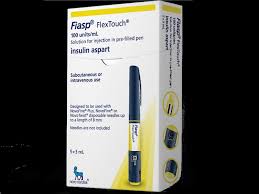- Home
- Editorial
- News
- Practice Guidelines
- Anesthesiology Guidelines
- Cancer Guidelines
- Cardiac Sciences Guidelines
- Critical Care Guidelines
- Dentistry Guidelines
- Dermatology Guidelines
- Diabetes and Endo Guidelines
- Diagnostics Guidelines
- ENT Guidelines
- Featured Practice Guidelines
- Gastroenterology Guidelines
- Geriatrics Guidelines
- Medicine Guidelines
- Nephrology Guidelines
- Neurosciences Guidelines
- Obs and Gynae Guidelines
- Ophthalmology Guidelines
- Orthopaedics Guidelines
- Paediatrics Guidelines
- Psychiatry Guidelines
- Pulmonology Guidelines
- Radiology Guidelines
- Surgery Guidelines
- Urology Guidelines
New fast-acting insulin Fiasp approved

New fast-acting insulin to treat diabetes known as Fiasp has been approved by FDA. It is faster acting insulin asparte which acts faster than existing fast-acting insulins and has been designed to help diabetics control post-meal spikes in blood sugar. Last year the FDA declined to approve the product and requested additional information.
Fiasp® (insulin aspart injection) 100 Units/mL, a fast-acting mealtime insulin is indicated to improve glycemic control in adults with type 1 and type 2 diabetes. It can be dosed at the beginning of a meal or within 20 minutes after starting a meal. It is a new formulation of NovoLog®, in which the addition of niacinamide (vitamin B3) helps to increase the speed of the initial insulin absorption, resulting in an onset of appearance in the blood in approximately 2.5 minutes. Fiasp® will be available in a pre-filled delivery device FlexTouch® pen and a 10 mL vial.
Many adults with type 1 and type 2 diabetes struggle with blood sugar control after meals. The result of this has led to many people with diabetes not achieving their target A1C.
"With Fiasp®, we've built on the insulin aspart molecule to create a new treatment option to help patients meet their post-meal blood sugar target," said Bruce Bode, MD FACE, President of Atlanta Diabetes Associates and Associate Professor at Emory University School of Medicine. "The intention of rapid-acting insulin therapy is to mimic, as much as possible, the natural physiological insulin response that occurs after meals, a process that is important for optimal A1C management."
The approval of Fiasp® is based on results from the onset phase 3a clinical development program. The clinical trials enrolled more than 2,000 adults with type 1 and type 2 diabetes to evaluate the efficacy and safety of Fiasp® administered both at mealtime and after starting a meal. Data from the trials showed that Fiasp®demonstrated a reduction in A1C in adults with type 1 and type 2 diabetes. Common adverse reactions, excluding hypoglycemia, occurring in ≥5% of subjects included nasopharyngitis, upper respiratory tract infection, nausea, diarrhea and back pain.

Disclaimer: This site is primarily intended for healthcare professionals. Any content/information on this website does not replace the advice of medical and/or health professionals and should not be construed as medical/diagnostic advice/endorsement or prescription. Use of this site is subject to our terms of use, privacy policy, advertisement policy. © 2020 Minerva Medical Treatment Pvt Ltd